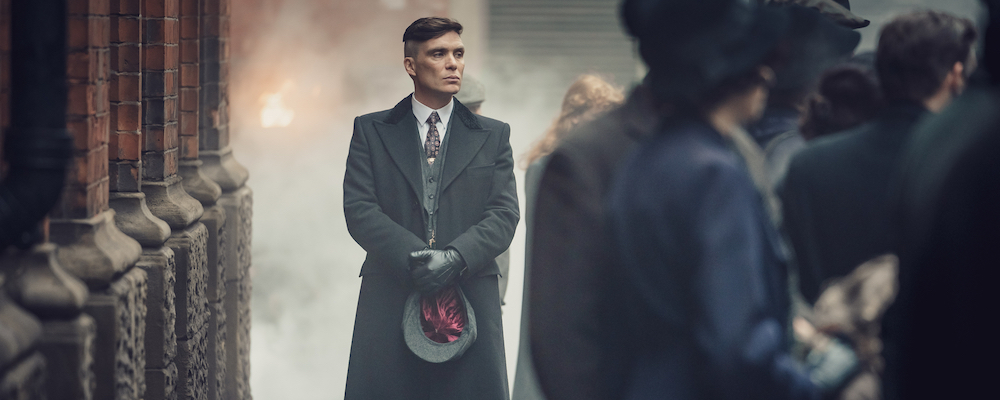‘Peaky Blinders’ Tackles the Rise of Fascism in Season 5
Andrew Bundy
In its fifth season, the ways that Steven Knight’s BBC gangster drama, “Peaky Blinders,” mirrors a number of other timeless shows is arguably more apparent than ever. But period details, creative choices made, and the strengths of an incredible cast make it clear that this show has a strong handle on those similarities, using them as a jumping off point to address a political topic that’s increasingly inescapable these days: the rise of fascism.
The new season begins on Black Tuesday in 1929. It’s been ten years since the show first introduced us to Tommy Shelby (Cillian Murphy) and his family, and things aren’t looking good for the future of the business. The man who came back from WWI a decorated war hero before turning to bookmaking, might now be a respected politician who runs a reputable crime family, but maintaining policies and making a profit is about to get a lot more complicated following the market crash.
Moving liquor and motor cars is the old way of doing things though, with cocaine, opium and heroin becoming the best options to guarantee lining one’s pockets. Young Michael (Finn Cole) has returned from America with his new wife (Anya Taylor-Joy) but has failed to come through with his Detroit business connections, in turn losing the company a large sum of their American investment money. Arthur (Paul Anderson) seems more overcome by the woes of his duties than ever, and his religiously devout wife Linda (Kate Phillips) is threatening to leave him due to all the violent crimes he and his brethren have commited. Things have become so bad that Tommy’s own kids are afraid of him. Informing his young son that his horse is dead almost seems harder for Tommy to do than ordering someone to be killed to protect the future of his business.
“Tommy, does your ambition have no limits?” his associate Aberama Gold (Aidan Gillen) asks him. Sure, Tommy seemingly has all the power in the world now, but he also hates himself for it. The PTSD war flashbacks of the early seasons have been replaced by guilt-driven, surreal dream-like visions in which Tommy sees the ghost of his lost love Grace (Annabelle Wallis), who died taking a bullet intended for him. Since losing Grace, Tommy has essentially seen death as a means to an end. “Sometimes, death is a kindness” is his new mantra.
While the series certainly doesn’t celebrate or glorify the Shelbys, it wants its audience to empathize with a man who sees killing as a casual way of ensuring his own survival. The show is very aware that the Shelbys have almost arrived at that point of no return, though, with Tommy growing increasingly suicidal and Arthur finding more and more reasons to loathe everything about himself. Cillian Murphy’s performance is something to behold. Giving a cold monologue at the end of the second episode, the camera dollies in as the spirits from his whisky in hand find his emotions swelling, the viewer almost being pulled into the circle of his power and anger, and the bottomless depths of his no longer manageable aggressions.
But Knight finds a clever way to ensure that the viewer still sees Tommy as a protagonist worth rooting for, pitting him against a far greater evil, a vessel for pure hatred, Oswald Mosley (Sam Claflin), the leader of the British Union of Fascists. As a singular character he does lack the looming presence of previous “Peaky Blinders” antagonists, played by talents such as Tom Hardy and Adrian Brody, but it’s the threat of what his coming to power represents — and, obviously what it so clearly parallels about modern times — that makes him a figure worth fearing. In a much less showy performance than past villains, Mosley hides personal and bigoted insecurities behind his Parliament smile. He’s a Nazi well worth punching out.
The new season successfully uses its historic setting to explore issues other gangster shows are significantly less interested in — with pulsating tribal images moving with the voltaic fervor of a Martin Scorsese picture, in contrast with the more introspective scenes, that are nonetheless shot with expressive energy. The politically charged nature of the fifth season wraps itself up in period, street-mob warfare, almost making the new string of episodes feel more in line with the social unrest of Scorsese’s 2002 film “Gangs of New York,” by the season finale — whereas its previously shared more in common with the HBO series “Boardwalk Empire,” which takes place roughly around the same time as the events of “Peaky Blinders.”
Natural selection is a term that comes up a few times in the new season, class warfare and racial tensions erupting as a result. Like “Deadwood” did, the show weaves Asian immigrant businesses into the fabric of its architecture, with “Warrior’s” Andrew Koji showing up for an extended cameo as Brilliant Chang, a new Chinese opium contact. “I don’t care about rituals,” he tells the Shelby’s, after they assume he shares the beliefs of just about every other Chinese man they’ve run across. His casting makes clear that “Peaky Blinders” is quite mindful of televisions ongoing and inevitable influence on itself. Rather than fight against what it already is, Koji’s casting points to the show’s firm sense of self-awareness. “Peaky Blinders” may put the Shelby’s in the classic “Godfather” crime family conundrum of how deeply to invest in the unknown future of the drug business, but, for some, it doesn’t come down to actual survival. For many rich and greedy men, it’s the fear of what tomorrow might bring, the fear of living in a world where the power they knew comes crashing down.
“Peaky Blinders” Season 5 begins streaming Oct. 4 on Netflix.

